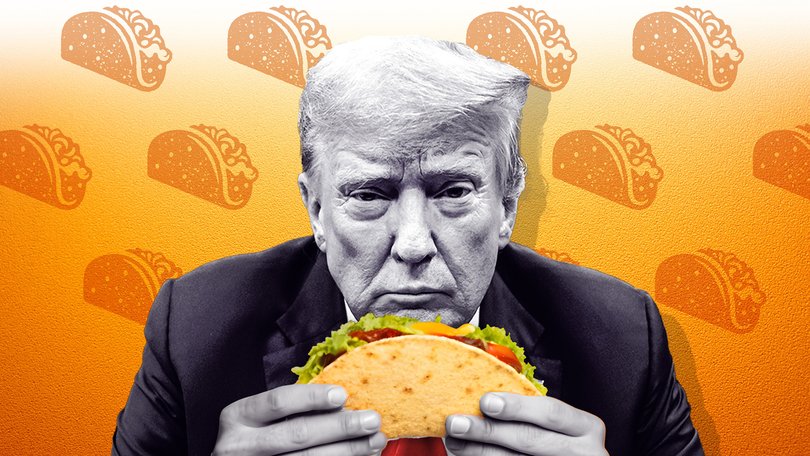THE ECONOMIST: How to strike a trade deal with US President Donald (TACO) Trump
THE ECONOMIST: Donald Trump has earned the nickname TACO — Trump Always Chickens Out — among some on Wall Street. Yet his counterparts are playing a similar game.

Another agreement, another personal triumph.
“It is my Great honour to announce that I have just made a Trade Deal with the Socialist Republic of Vietnam,” President Donald Trump wrote on July 2nd.
“Dealing with General Secretary To Lam, which I did personally, was an absolute pleasure.”
Sign up to The Nightly's newsletters.
Get the first look at the digital newspaper, curated daily stories and breaking headlines delivered to your inbox.
By continuing you agree to our Terms and Privacy Policy.The deal showed countries were caving in to his threats, he said.
It is Mr Trump’s second such claim — the first was after an agreement with Britain in May — following his decision on April 9 to delay America’s sweeping “reciprocal” tariffs for 90 days.
Officials promised “90 deals in 90 days” by July 9, but progress has been slow.
Mr Trump has said that Canada and the European Union have been “very nasty” and Japan “very spoiled”.
The aim now is to secure minimal “frameworks” with 10 or so countries.
It is unclear whether the deadline will hold, and what will happen if it does not.
Mr Trump has threatened to send letters declaring talks over and tariffs back on.
How are America’s trading partners navigating the chaos?
Mr Trump has earned the nickname TACO — Trump Always Chickens Out — among some on Wall Street.
Yet his counterparts are playing a similar game.
For them, the risk of all-out conflict is too great.
Most, aside from China, have chosen a strategy that could be called DOVE: Diplomacy Over Visible Escalation.
Canada dropped its plan to tax American tech firms after a furious response from Mr Trump.
The EU removed bourbon from its retaliation list after he threatened tariffs of 200 per cent on French wine.
Even though the bloc is preparing a package of retaliatory measures covering €95b ($AU170b) of trade to present a “credible threat”, internal divisions and fear of escalation will probably hold it back from ever putting the measures into practice.
Britain’s and Vietnam’s deals were narrow, involving only modest concessions — including pledges to curb Chinese influence — in return for targeted relief.
Britain won a reprieve on car levies and future taxes on plane parts by granting American beef and ethanol access to its market, and pledging limits on Chinese supply-chain involvement, while leaving thornier matters for another day.
Vietnam agreed to open up to SUVs and to accept higher tariffs on Chinese packages stopping off in the country on the way to America.
It now faces levies of 20 per cent on most goods, down from the 46 per cent threatened in April.
Others are following a similar script, hoping to swap meagre concessions for exemptions.
The EU is reportedly willing to accept an overall tariff of 10 per cent in exchange for relief on cars and pharmaceutical products.
It is also willing to buy more American weapons and natural gas, and address shared concerns over China.
India is on track for an interim deal after doubling oil imports from America and indicating it will purchase more liquefied natural gas, fruit and nuts.
Japan has proposed a gradual reduction in auto tariffs tied to direct investment in America’s car industry.
But even such limited deals face obstacles.
Domestic politics often makes capitulation impossible.
India insists on protecting its dairy and wheat markets.
Japan has ruled out accepting tariffs of 25 per cent on cars or making concessions that might anger farmers ahead of an election to the upper house of parliament on July 20.
Uncertainty over America’s sectoral probes, including into medicines and semiconductors, which could result in more tariffs, chills negotiations further.
Lee Jae-myung, South Korea’s president, has emphasised China’s importance as a trading partner — an example of the regional balancing act many countries face.
As Mr Trump’s deadline approaches, expect a few more “agreements in principle”.
Many tariffs will remain, and the stickiest disputes — over agriculture, cars and digital-market rules — will stay unresolved.
The ensuing months will then bring more mini-deals and market jitters.
It is unclear what America gains from this. Any attempt to bring back industry is undermined by carve-outs.
Levies to extract concessions produce only token purchases. Instead of disciplining trade partners, tariffs have created a fragmented system that leaves everyone guessing.
Originally published as How to strike a trade deal with Donald Trump
